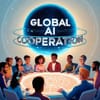As artificial intelligence (AI) rapidly evolves and transforms industries around the world, a growing number of global leaders and experts are calling for international cooperation to manage its development responsibly. At a recent global AI cooperation conference, experts discussed the challenges and opportunities AI presents, emphasizing the importance of collaboration across borders to ensure that AI benefits humanity as a whole—without exacerbating global inequalities or posing risks to safety and privacy.
AI is already making a significant impact in sectors like healthcare, finance, and transportation. However, as powerful as AI systems have become, they also raise important ethical and regulatory questions. Issues like data privacy, algorithmic bias, job displacement, and the potential for misuse of AI in military or surveillance applications are all concerns that require global cooperation to address effectively. Without a unified approach, experts warn, AI development could advance unevenly, creating gaps between countries and leading to unintended consequences.
The conference, which gathered policymakers, industry leaders, and tech innovators, highlighted the need for global standards and regulations to ensure that AI is developed safely and ethically. “We cannot afford to have individual countries or companies working in silos,” said one expert. “The development of AI is too significant to be handled only by a few powerful nations or tech giants. It’s a global issue, and it requires global solutions.”
A major theme at the conference was the need for transparency and accountability in AI systems. As AI becomes more integrated into daily life, ensuring that algorithms are transparent, explainable, and free from bias is crucial. This means developing frameworks that allow AI to be audited, making sure its decisions can be traced and understood by both developers and users. Such transparency would build trust in AI systems and help mitigate concerns over issues like discrimination or unintended harms caused by algorithmic decisions.
In addition to ethical concerns, there is also the issue of AI’s impact on the workforce. Automation powered by AI has the potential to replace many jobs, especially in industries like manufacturing and logistics. However, AI also has the ability to create new opportunities for innovation and entrepreneurship. The key to navigating this transition, experts argue, is ensuring that workers are retrained and upskilled to adapt to the changing job market. Policymakers must invest in education and training programs that prepare the next generation for the types of jobs that will emerge in an AI-driven economy.
One of the most pressing challenges discussed at the conference was the role of AI in international relations. While AI has the potential to improve diplomacy and strengthen global cooperation, it also has the ability to spark competition and even conflict. There are concerns that AI could be used in ways that undermine global stability, such as through the development of autonomous weapons or cyber-attacks. As AI continues to evolve, there is a growing call for treaties and agreements to prevent AI from being weaponized or misused for geopolitical gain.
Despite these challenges, the overall tone of the conference was optimistic. Many experts believe that with the right policies, regulations, and international collaboration, AI can be a force for good, driving economic growth, improving healthcare, and tackling global challenges like climate change and poverty. The key, they say, is ensuring that AI development is guided by principles of fairness, equity, and social responsibility.
As the conference concluded, the participants agreed that the road ahead would require ongoing dialogue and cooperation. While there are certainly risks associated with AI, there is also enormous potential. The goal moving forward, they said, is to ensure that the future of AI is one that benefits everyone, regardless of their location or economic status. With the right level of global cooperation, AI could become a powerful tool for creating a more just and sustainable world.


